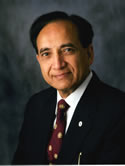SCCRO (DCUN1D1) induces extracellular matrix invasion by activating matrix metalloproteinase 2 Journal Article
| Authors: | O-Charoenrat, P.; Sarkaria, I.; Talbot, S. G.; Reddy, P.; Su, D.; Ngai, I.; Shaha, A.; Kraus, D.; Shah, J.; Rusch, V.; Ramanathan, Y.; Singh, B. |
| Article Title: | SCCRO (DCUN1D1) induces extracellular matrix invasion by activating matrix metalloproteinase 2 |
| Abstract: | Purpose: Ectopic expression of squamous cell carcinoma-related oncogene (SCCRO or DCUN1D1) in NIH-3T3 cells induces invasion in vitro and produces highly invasive xenografts in nude mice with a propensity for regional lymphatical metastasis. The aim of this study was to identify the molecular mechanism underlying SCCRO-induced invasion and metastasis. Experimental Design: The molecular mechanism of SCCRO-mediated effects on matrix metalloproteinase-2 (MMP2) levels and activity were assessed using a combination of cell biological and molecular methods, including real-time PCR, reporter assay, RNA interference, and chromatin immunoprecipitation assay. Tumor specimens from primary upper aerodigestive tract carcinomas (n = 89) were examined for levels of SCCRO, MMP2, MMP9, MT1-MMP, TIMP1, and TIMP2 mRNA by real-time PCR. Results: Overexpression of SCCRO increases MMP2 levels and activity, which is required for SCCRO-induced invasion. Modified McKay assays reveal that SCCRO does not bind to the MMP2 promoter, suggesting that its transcriptional effects are indirect. Deletion or mutation of the activator protein-2 (AP2) and p53 binding element within the MMP2 promoter abrogates SCCRO-driven activation. Ectopic expression of SCCRO increases AP2 levels and promotes the binding of p53 to the MMP2 promoter. Consistent with these findings, SCCRO and MMP2 are coexpressed (P < 0.0001; r2 = 0.58; 95% confidence interval, 0.46-0.69) in primary (upper aerodigestive tract) carcinomas (n = 89), and this coexpression is associated with an increased prevalence of regional nodal metastasis (P = 0.04; relative risk, 1.53). Conclusions: SCCRO-induced invasion involves activation of MMP2 transcription in an AP2- and p53-dependent manner. SCCRO is a potential marker for metastatic progression in affected cancers. © 2008 American Association for Cancer Research. |
| Keywords: | adult; controlled study; human tissue; protein expression; aged; aged, 80 and over; middle aged; unclassified drug; oncoprotein; gene mutation; human cell; major clinical study; gene deletion; genetics; squamous cell carcinoma; carcinoma, squamous cell; nonhuman; lymph node metastasis; animal cell; mouse; animal; metabolism; animals; mice; metastasis; lung neoplasms; prevalence; gelatinase b; protein binding; transcription factor; rna interference; enzyme activation; in vitro study; enzymology; enzyme activity; cell line, tumor; protein p53; physiology; oncogenes; extracellular matrix; molecular mechanics; lung tumor; oncogene; tumor suppressor gene; biosynthesis; xenograft; head and neck neoplasms; chromatin immunoprecipitation; oncogene proteins; tumor cell line; neoplasm metastasis; cell invasion; head and neck tumor; tissue inhibitor of metalloproteinase 1; tissue inhibitor of metalloproteinase 2; genes, p53; gelatinase a; matrix metalloproteinase 14; transcription factor ap 2; matrix metalloproteinase 2; squamous cell carcinoma related oncogene; transcription factor ap2; dcun1d1 protein, human; transcription factor ap-2 |
| Journal Title: | Clinical Cancer Research |
| Volume: | 14 |
| Issue: | 21 |
| ISSN: | 1078-0432 |
| Publisher: | American Association for Cancer Research |
| Date Published: | 2008-11-01 |
| Start Page: | 6780 |
| End Page: | 6789 |
| Language: | English |
| DOI: | 10.1158/1078-0432.ccr-08-0719 |
| PUBMED: | 18980971 |
| PROVIDER: | scopus |
| DOI/URL: | |
| Notes: | --- - "Cited By (since 1996): 4" - "Export Date: 17 November 2011" - "CODEN: CCREF" - "Source: Scopus" |
Altmetric
Citation Impact
BMJ Impact Analytics
MSK Authors
Related MSK Work









